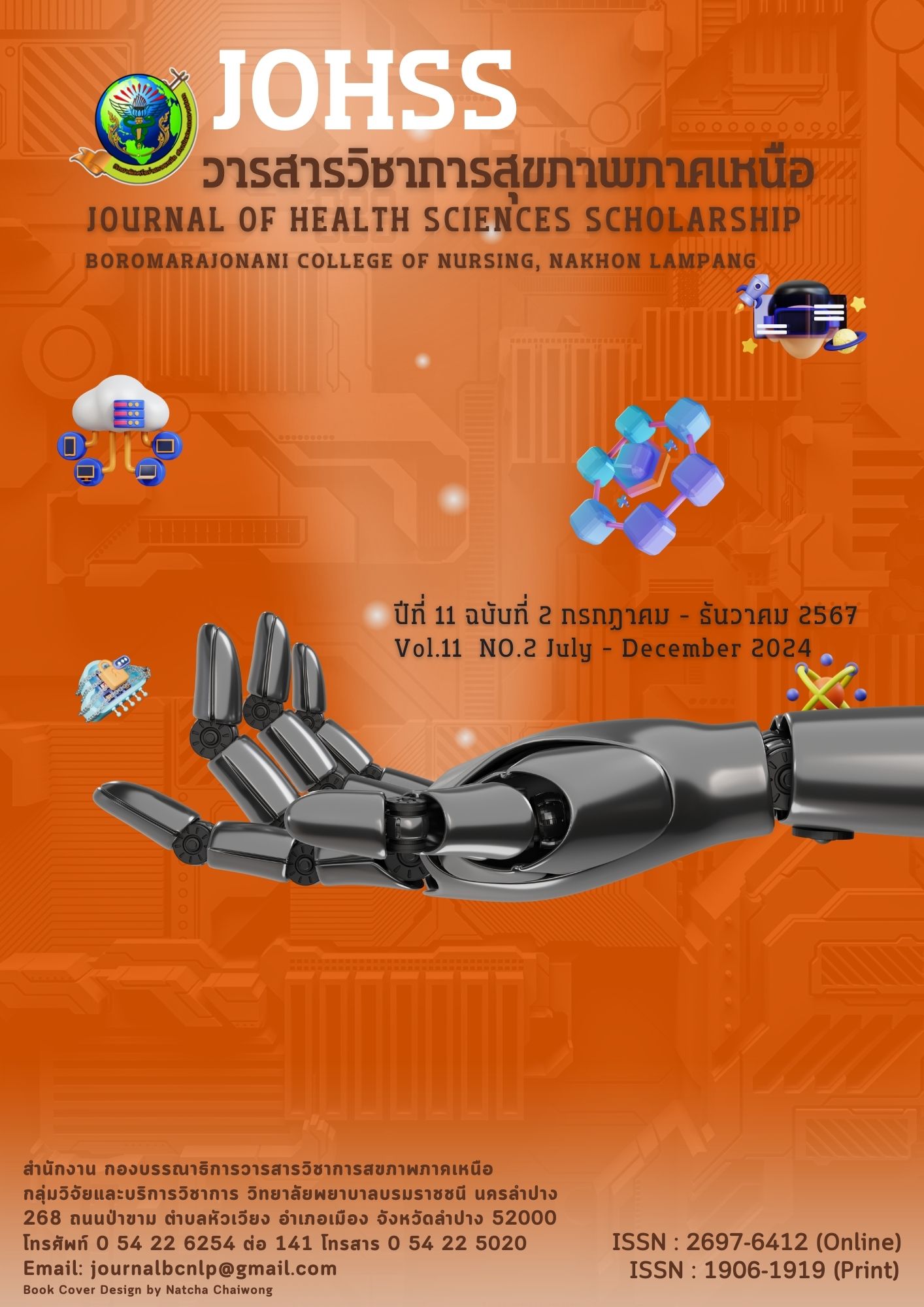ผลของการเสริมสร้างความเข้มแข็งทางใจต่อความเข้มแข็งทางใจของผู้ใหญ่วัยทำงาน อำเภอเมือง จังหวัดนครสวรรค์
คำสำคัญ:
การเสริมสร้างความเข้มแข็งทางใจ, ความเข้มแข็งทางใจ, ผู้ใหญ่วัยทำงานบทคัดย่อ
การวิจัยครั้งนี้เป็นการวิจัยกึ่งทดลองแบบหนึ่งกลุ่ม เพื่อศึกษาผลของการเสริมสร้างความเข้มแข็งทางใจต่อความเข้มแข็งทางใจของผู้ใหญ่วัยทำงาน กลุ่มตัวอย่าง คือ ผู้ใหญ่วัยทำงาน ตำบลวัดไทรย์ อำเภอเมือง จังหวัดนครสวรรค์ที่ได้มาจากการสุ่มตัวอย่างอย่างง่าย โดยวิธีการจับสลากเลือก 1 ตำบล จากทั้งหมด 17 ตำบล จำนวน 36 ราย กลุ่มตัวอย่างได้รับโปรแกรมการเสริมสร้างความเข้มแข็งทางใจ ซึ่งประกอบด้วย 10 กิจกรรม จำนวน 3 ครั้ง แต่ละครั้งห่างกัน 1 สัปดาห์ เก็บรวบรวมข้อมูลโดยใช้แบบสอบถาม ได้แก่ ข้อมูลทั่วไป และแบบประเมินความเข้มแข็งทางใจ ซึ่งผ่านการตรวจสอบจากผู้ทรงคุณวุฒิ มีค่าความเชื่อมั่นสัมประสิทธิ์แอลฟาของครอนบาคเท่ากับ 0.72 วิเคราะห์ข้อมูลโดยใช้สถิติพรรณนา และสถิติทีแบบจับคู่
ผลการวิจัย พบว่า คะแนนเฉลี่ยความเข้มแข็งทางใจของผู้ใหญ่วัยทำงานหลังได้รับโปรแกรมสูงกว่าก่อนได้รับโปรแกรมฯ อย่างมีนัยสำคัญทางสถิติที่ระดับ .05 ผลการวิจัยแสดงให้เห็นว่า โปรแกรมการเสริมสร้างความเข้มแข็งทางใจสามารถเพิ่มความเข้มแข็งทางใจได้ ส่งผลดีต่อภาวะสุขภาพจิต และความผาสุก ดังนั้น สามารถนำไปใช้เป็นแนวปฏิบัติในการพัฒนาโปรแกรมหรือกิจกรรมในการดูแลสุขภาพจิตของผู้ใหญ่วัยทำงานให้สามารถเผชิญกับปัญหาต่าง ๆ ที่เกิดขึ้นในชีวิตได้
เอกสารอ้างอิง
Chaiwong, N., & Maneepun, N. (2020). The effects of the resilience enhancement program on adjustment of the first year nursing students in faculty of nursing at Buriram Rajabhat University. Udonthani Hospital Medical Journal, 28(3), 315-325. (in Thai)
Chinnak, T., Vatanasin, D., & Hengudomsub, P. (2023). Effects of resilience-enhancing program on well-being among mothers of children with autistic disorder. Thai Pharmaceutical and Health Science Journal, 18(1), 77-83. (in Thai)
Cohen, J. (1988). Statistical power analysis for the behavioral sciences (2nd ed.) Lawrence Erlbaum Associates.
Division of Labor Economics, Office of Permanent Secretary, Ministry of Labor. (2023). Labor situation, 1st quarter of 2020 (January-March 2023). Office of Permanent Secretary, Ministry of Labor. (in Thai)
Department of Mental Health (2007). Mental health assessment form. Department of Health Service Support, Ministry of Public Health. (in Thai)
Department of Mental Health (2023). Dashboard information on assessing the mental health of Thai people. (in Thai)
Detkong, T. (2021). Course to strengthen the mind (4th ed.). Beyond. (in Thai)
Grotberg, E. H. (1995). A Guide to promoting resilience in children: Strengthening the human spirit. Bernard Van Lee Foundation.
Grotberg, E. H. (1997). The international resilience project: Findings from the research and the effectiveness of interventions. https://files.eric.ed.gov/fulltext/ED419584.pdf
Institute of Population and Social Research Mahidol University. (2023). Health of Thai people 2020: Thailand’s promises in the “COP”: (COP: Conference of Parties) and dealing with “World chaos”. Amarin Printing and Publishing Co., Ltd. (in Thai)
Intasit, S., & Julkiree, S. (Eds.). (2020). Change Bad to Good. RQ: Resilience Quotient (4th ed.). Beyond Publishing Co., Ltd. (in Thai)
Kongdee, W. (2020). Situation “Current disease” of working age in the present world. https://www.ohswa.or.th/17675458/health-promotion-for-jorpor-series-ep2 (in Thai)
MacLeod, S., Musich, S., Hawkins, K., Alsgaard, K., & Wicker, E. R. (2016). The Impact of resilience among older adults. Geriatric Nursing, 37(4), 266-272.
Nakhonsawan Provincial Office. (2022). Important information for Nakhonsawan province for the year 2022. https://data.go.th/en/dataset/nakhonsawan012565 (in Thai)
Nintachan, P., Sangon. S., & Thaweekoon, T. (2012). A Resilience-enhancing program. Judthong. (in Thai)
Phuttharod, P., & Sillapagumpised, K. (2021). The Effect of a resilience enhancement program on self-esteem and depression of the elderly with depressive disorder. Research Community and Social Development Journal, 5(1), 70-81. (in Thai)
Polit, D. F. & Beck, C. T. (2008). Nursing Research: Principles and Methods. Lippincott.
Tabtim, D., Intarakamhang, U., & Choochom, O. (2021). Resilience of family caregivers: An important to caring elderly diabetes mellitus patients. Journal of Social Science and Buddhistic Anthropology, 6(1), 1-16.
Tantipiwatanaskul, P. (2008). Guidelines for organizing learning activities to build mental strength for secondary school students. Agricultural Cooperatives Association of Thailand Co., Ltd. (in Thai)
Thongbunjob, K. & Inchaithep, S. (2022). The Correlations between ability to manage mental problems and negative emotional state among working-age population in rural Lampang province. Journal of Health Sciences and Pedagogy, 2(2), 19-31. (in Thai)
Threeyakul, P. (2020). Effect of resilience on depression and quality of life in persons with chronic renal failure who receiving hemodialysis. Journal of the Phrae Hospital, 28(2), 76-89. (in Thai)
ดาวน์โหลด
เผยแพร่แล้ว
ฉบับ
ประเภทบทความ
สัญญาอนุญาต
ลิขสิทธิ์ (c) 2024 วิทยาลัยพยาบาลบรมราชชนนี นครลำปาง

อนุญาตภายใต้เงื่อนไข Creative Commons Attribution-NonCommercial-NoDerivatives 4.0 International License.
บทความ ข้อมูล เนื้อหา รูปภาพ ฯลฯ ที่ได้รับการตีพิมพ์ในวารสารวารสารวิชาการสุขภาพภาคเหนือ ถือเป็นลิขสิทธิ์ของวารสารวารสารวิชาการสุขภาพภาคเหนือ หากบุคคลหรือหน่วยงานใดต้องการนำทั้งหมดหรือส่วนหนึ่งส่วนใดไปเผยแพร่ต่อหรือเพื่อกระทำการใดๆ จะต้องได้รับอนุญาตเป็นลายลักอักษรจากวารสารวารสารวิชาการสุขภาพภาคเหนือก่อนเท่านั้น
เนื้อหาและข้อมูลในบทความที่ลงตีพิมพ์ในวารสารวิชาการสุขภาพภาคเหนือถือเป็นข้อคิดเห็นและความรับผิดชอบของผู้เขียนบทความโดยตรงซึ่งกองบรรณาธิการวารสาร ไม่จำเป็นต้องเห็นด้วย หรือร่วมรับผิดชอบใดๆ
อนึ่ง ข้อความและข้อคิดเห็นต่างๆ เป็นของผู้เขียนบทความนั้นๆ ไม่ถือเป็นความเห็นของวารสารฯ และวารสารฯ ไม่จำเป็นต้องเห็นด้วยกับข้อความและข้อคิดเห็นใดๆ ของผู้เขียน วารสารฯ ขอสงวนสิทธิ์ในการพิจารณาตีพิมพ์ตามความเหมาะสม รวมทั้งการตรวจทานแก้ไขหรือขัดเกลาภาษาให้ถูกต้องตามเกณฑ์ที่กำหนด



